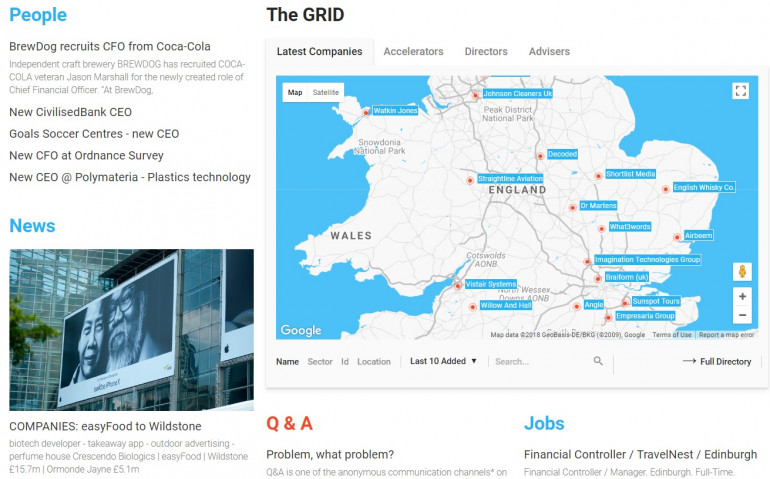Published by Directorzone Markets Ltd on May 2, 2017, 9:00 am in Knowledge, Market Info
Wednesday January 1st 2020
LSE: Elite Start-Ups + Private Placements | Scottish Space Cluster | Small Cap M&A; | 100pc increase in UK Distilleries | Northern Life Sciences Success | Blockchain Revolution | Corbyn Slams Late-Payers | London Top of FT1000 | EIS lifeline for Entrepreneurs | The Chinese are coming…
Digest of news and trends in the GRID marketplace in April 2017:
LSE: ELITE START-UPS + PRIVATE PLACEMENTS
London Stock Exchange Elite programme … latest cohort | Lynsey Barber City A.M. April 27
… 17 companies to be selected for the London Stock Exchange's accelerator programme. The LSE Elite programme provides support to high-growth small businesses including access to investors. See FULL LIST: ELITE programme: 100 UK companies, 17 new
Company | Location | Sector
6T9 | Norfolk | Engineering
BEEZER | Belfast | Technology
BLAZE | London | Hardware and equipment
ERGONOMIC SOLUTIONS | Kent | Technology
HAMMERSMITH MEDICINES RESEARCH LIMITED | London | Medical Research
HUB PRODUCTIONS | Kent | Technology
HYBRID AIR VEHICLES | London | Engineering
ISG | London | Financial Services
MUMSNET | London | Digital
NUTMEG | London | Financial Services
OPENGENIUS | Cardiff | Technology
PAVEMENT TESTING SOLUTIONS | Lancashire | Industrial Services
PROFILE FINANCIAL SOLUTIONS | Preston | Financial Services
THE NWH GROUP | Dalkeith | Industrial Services
THESQUA.RE | London | Travel
VIA DEVELOPMENTS | Manchester | Property
V-NOVA | London | London
Previous members of the programme which number more than 100 since it started in the UK in 2014, with combined revenues of £1.6bn and employing more than 12,000 people. They include NAKED WINES, the online wine seller snapped up by MAJESTIC WINES for £70m in 2015, snack company GRAZE, the mini computer RASPBERRY PI and GOLDEN GOOSE, the high-end shoe company.
More than 500 international companies have passed through the scheme, which started in Italy in 2012, boasting a combined £35bn in revenue and 180,000 jobs. Head of the programme, Umerah Akram, LSEG.
The firms will also be eligible to join the LSE's new private placement platform to give it access to funding from institutional investors.
London Stock Exchange launches private placement platform | Javier Espinoza, FT. April 5
The London Stock Exchange Group has launched its first-ever private placement platform as it looks to help fast-growing businesses access financing more easily. Investors will take minority stakes in more than 500 companies with no limit on how much capital can be deployed.
The capital will come from large institutional investors — including BLACKROCK and FIDELITY — and private equity groups CARLYLE, EQUINOX and RIVERROCK.
The platform will help companies expand the pool of possible investors and access the appropriate type of financing — from venture capital to private equity. Investments will be across 34 sectors, including technology, food and beverages, and the LSE expects many private banks and family offices to join.
The companies — with an average size of €80m — are members of the LSE’s accelerator programme, known as ELITE CLUB DEAL, which was set up in 2012 and covers 25 countries. The companies generate €40bn in combined revenues and account for more than 175,000 jobs across Europe and beyond.
Luca Peyrano, chief executive of the LSE’s Elite programme.
Since its launch, the Elite programme has registered 272 corporate transactions from 133 companies, including 150 mergers and acquisitions, and seven initial public offerings. The average value of the transactions through the platform, which is powered by THE HUB, itself an Elite programme company, is expected to be about €100m.
Many of the companies are not ready to go public yet and the platform will help companies continue to grow. The businesses can eventually either launch an IPO or be sold to a private equity group or in a venture capital transaction.
“Investors will be able to screen deals, manage portfolios of investments through the platform,” said Stephen Ong, co-founder of the Hub. “We will power their corporate venturing and grow their network.” Mr Ong said the idea of the platform could be also implemented in smaller private equity networks — from early-stage growth companies to those pre-IPO.
Fundraising has been held on an informal basis. The platform is expected to speed up the length of time it takes companies to raise capital from 12-18 months down to six months on average.
FT READER COMMENT: Salvatore Bragantini – “What the article does not say is that the Elite Club Deal platform is the child of Borsa Italiana, which the Lseg acquired about 10 years ago. Most Elite companies are still, and will probably continue to be for some time, medium-sized Italian companies, innovative and with excellent growth prospects. Elite has groomed them for access to market (as opposed to bank) finance, both public and private, without forcing them to seek a proper listing. Kudos to Raffaele Jerusalmi, CEO of Borsa Italiana, and to Luca Peyrano …for this trail-blazing effort.”
SCOTTISH SPACE CLUSTER
Maker of tiny satellites eyes a bigger role | Mure Dickie, FT. April 21
Mr Clark … hopes the area might some day achieve a reputation for production of spaceships that emulates that of the famous Clyde shipyards that once built a large share of the world’s ocean-going vessels. Inspired by CLYDE SPACE, US satellite data company SPIRE has set up its European base in Glasgow and has built dozens of spacecraft there. Analysts say Scotland is already seeing the emergence of a “space cluster” with considerable potential. Mr Clark cites forecasts of demand for thousands of small satellites in the next five years as reason to expect “hockey stick” market growth. Research by the UK’s SATELLITE APPLICATIONS CATAPULT forecasts there will be about 1,700 small satellites launched globally from 2017 through to 2021, of which 1,500 will be in the 1kg -50kg range.
SMALL CAP M&A;
UK small brokers make a move into banks’ M&A; turf | Chloe Cornish and Thomas Hale, FT. April 17
UK corporate activity …. trends are pushing stockbrokers and smaller investment banks, whose revenues have typically relied on matching institutional investors with companies wanting to float, to broaden their services. Also faced with pressure from new regulation and falling trading commission fees, groups such as NUMIS, INVESTEC and PANMURE GORDON are expanding into new areas, particularly mergers and acquisitions — the traditional turf of bigger investment banks and specialist houses.
According to Dealogic just 38 small and mid-sized companies went public in the UK in 2016. In 2007, a boom year before the financial crisis, 181 companies were shepherded on to Aim, London’s junior market.
Many analysts blame uncertainty surrounding Brexit for deterring companies and investors. Despite a global uptick in IPO volumes so far in 2017, London’s share has fallen to its lowest level for any start to the year since 2012. Azhic Basirov, head of capital markets at advisory group, SMITH & WILLIAMSON, estimates that firms providing corporate advisory services to the mid-market need “around 100 IPOs a year for that market to be healthy”.
By contrast, the first quarter of 2017 was the most frenetic in two years for M&A; activity, with 16 deals announced — although that was still slow compared with Aim’s 2008 heyday, when 58 deals were announced in a single quarter.
Numis recently advised aviation company JOHN MENZIES on its takeover of AIRCRAFT SERVICES INTERNATIONAL GROUP, a $202m deal completed in January. It also worked on convenience group MCCOLLS’ purchase of 298 shops from the Co-operative Group. Numis has 186 corporate clients, 47 of which are FTSE 350 according to Adviser Rankings.
On a larger scale, Johannesburg and London-listed INVESTEC has grown its M&A; division to become a full service investment bank. Between 2011 and 2016, Investec advised on 31 UK public takeover deals worth £8.25bn — putting it only behind bulge bracket JPMorgan Cazenove and M&A; specialist Rothschild in terms of deal value, according to FactSet.
But it is a difficult strategy to replicate. Several smaller brokers say generating M&A; business is difficult. CENKOS was one listed broker hurt by the slowdown in IPOs last year — its pre-tax profit fell 78 per cent compared with 2015. Cenkos’s M&A; specialist, Nick Wells … says the majority of its M&A; work still comes from existing clients.
James Serjeant, former managing director of corporate broking at Numis and now executive director at DOWGATE CAPITAL STOCKBROKERS, says many smaller brokers “don’t have the resources that the bulge bracket [banks] have to devote to this.” “Most small-cap brokers, whatever they say, are not set up to do M&A; work,” agrees Mark Brown, former chief executive of Collins Stewart and current head of small to mid-cap broker STOCKDALE SECURITIES. While his firm advised on nine M&A; deals in 2016, Mr Brown explains that most of these transactions “were really performing a regulatory function” for corporate clients that were taken over.
“Depending on the size of the company you might expect £200,000,” he says — small fees compared to the mega payouts made for M&A; advisory.
100pc INCREASE IN UK DISTILLERIES
Creative UK distillers ferment an indie explosion | Conor Sullivan and Cat Rutter-Pooley, FT. April 17
The number of distilleries in the UK rose by a sixth last year, thanks to the growing preference for gin and whisky made by “craft” producers rather than established corporations. Forty distilleries opened in the UK in 2016, bringing the total to 273, according to a Wine and Spirit Trade Association report based on HM Revenue & Customs data. The growth means the number of distilleries in the UK has more than doubled since 2010, the WSTA said.
The trend for boutique gins and other “artisan” spirits follows the fashion for craft beer, as consumers opt for niche, local brands over those made by big multinational brewers and distillers.
… James Simmonds from the accountancy firm UHY HACKER YOUNG … said the number of M&A; deals in the sector was encouraging entrepreneurs to start companies.
Daniel Szor, who founded the COTSWOLDS DISTILLERY in 2014, said the trend was based on “not just on the product but on where it comes from, how it was made — the artisanal values”.
In December, Japan’s Beam Suntory, the third-largest distiller in the world by sales, bought SIPSMITH, a small gin producer founded in a London garage seven years ago.
The trend for high-quality, niche spirits has in turn sparked growth in the market for mixers. FEVER-TREE last month said its revenues grew 73 per cent in 2016 and announced it planned to expand from tonic waters into mixers for dark spirits such as whisky.
The craft beer sector has also seen interest from private equity firms. Earlier this month, BREWDOG, the independent Scottish brewery known for its brash marketing, raised £100m from the American private equity firm TSG Consumer Partners in a deal that gave it an enterprise value of £1bn.
NORTHERN LIFE SCIENCES SUCCESS
The north of England’s life sciences industry is not for the faint hearted | Andy Bounds and Chris Tighe, FT. April 15
The North of England has a flourishing life sciences industry, with two companies floating on Aim this month — INTEGUMEN, based in York, and SKINBIOTHERAPEUTICS of Manchester.
Research released this week found that the North was more than twice as effective as London at turning public research pounds into life science patents — by number at least. The Northern Health Science Alliance (NHSA) said the region’s hospitals and universities produced 386 patents in the past decade, just short of London’s 401. The North receives 13.5 per cent of national health research funding, compared with London’s 32 per cent. The north receives less private investment too, with the NHSA arguing that moneymaking opportunities are being missed. But investing in these early-stage companies is not for the faint hearted.
BLOCKCHAIN REVOLUTION
See 2 articles from Harriet Green, City A.M:
1. When blockchain meets online lending: The business using one to improve the other | April 13
Leveraging technology to create a new asset class has been done a fair amount in the financial world – most notably in recent years by the P2P industry, which makes credit more accessible, faster and cheaper for individuals and business while delivering a return to investors, via increasingly accurate risk profiling.
Sydney-based platform OTHERA goes a step further: the blockchain lending platform allows lenders and investors to access digital loans. It then chops up those loans – which are backed by businesses’ cashflows – in a process called tokenisation. These tokens can then be sold on an exchange, turning a traditionally fairly illiquid asset into a highly liquid digital asset. … founder and chief executive John Pellew, a former investment banker:
“The overarching reason for launching Othera and building a blockchain lending platform is to unlock the alternative investment asset class and help it become mainstream. …You use blockchain to provide ongoing credit analysis of borrowing firms. ….every single interaction between the borrower and the lender is logged on it. This fine-grain loan-level data and loan performance data can be shared by the lender on a permissioned basis to whoever requires it. That could be the investor, the regulator, the auditor, or an alternative investment asset analyst company like AltFi Data, who can run comparative loan and loan book performance analytics on lenders and loans and hence the assets available for investment.
When we talk about TOKENISATION in the context of our platform, I am talking about the process of linking the rights to loan repayment cashflows (the principal and interest of the loan) to a digital cryptographic token similar to a bitcoin. So if you hold (own) the token, you will receive the pro rata portion of the loan repayment that your token represents. Tokens represent a digital form of fixed-income alternative investment. Tokens can be bought and sold just like an equity or bond or cryptocurrency.”
2. Consumer's guide to blockchain: How the cryptocurrency will revolutionise life for the consumer | February 18.
Being immutable means that, once recorded, data on the blockchain cannot be unwritten. In the case of bitcoin, this prevents individual coins from being spent multiple times, a key problem in the early days of the cryptocurrency.
A distributed ledger is simply a public record of who owns what. But the reason so many people are excited about blockchain is that, since there is no single authority, unlike in a centralised system, there can be no single point of failure. The “distributed” nature of the technology is of the essence because it is what makes it robust against information disappearing: the more people there are in the network, the more difficult it is to disrupt the blockchain.
As Peter Kirby, chief executive of blockchain startup FACTOM, says, the fundamental point about blockchain is that it cuts out a trusted third party (like PayPal in online payment transactions) and allows multiple parties to agree on a single version of the truth, while not being owned by anyone. …. the technology has moved on. In the past two years …. “traditional” blockchain has paved the way for a second generation of the technology.
Imran Gulamhuseinwala, head of fintech at EY … says, blockchain startups (of which there are an estimated 790 worldwide) that have effectively been acting as consultants in the space are now seeking and finding partners – in the form of large organisations that provide them with a market. …And, blockchains are no longer structured to be public; there are now private ones, which can be accessed only by accredited individuals (known as permission-based), and the process is controlled – which also means they aren’t as secure.
Kirby points out that using blockchain is really about solving a data problem. Away from the revolutions blockchain will bring around enabling digital currencies (it’s worth remembering that, according to a McKinsey report, 2.5bn people worldwide are unbanked), and streamlining the financial services sector, these distributed ledgers are being used to knock out the need for a trusted third party in a range of transactions that stretch beyond finance. …some consumer-based applications:
· IDENTITY. …. to create digital IDs – where your identity is immutably recorded. With company ONENAME, for example, you sign up and receive a unique, time-stamped blockchain ID. This is verified by other participants in the network. You can then link your ID with your social media profiles and share it on your website and on business cards so that people can find you more easily online. ….And other companies are following suit – from putting birth and death certificates on the blockchain to creating new versions of marriage. The first pilot of UK-based BITNATION, which debuted its blockchain ID last year and has been working on a private passport product…
· DIGITAL ASSETS. Blockchain can also provide a record of ownership. Kirby’s firm FACTOM rose to prominence last year for its attempt to work with the Honduran government to build a land title registry for the country on the blockchain. Insecure property rights can be crippling for countries and, more vitally, for individuals, as it can be hard to establish and enforce ownership or use land as collateral.
· SMART CONTRACTS. But the applications of blockchain go beyond creating a fixed record – if it’s combined with smart contracts. …. blockchain adds a new dimension: ownership, for example, can be proved and connected to the terms of a given contract. And the lack of a central third party means contracts can be executed far more quickly. With land titles, a smart contract can automate the passing of ownership from one party to another. …. Jessi Baker, founder of UK blockchain startup PROVENANCE, which uses the blockchain and smart contracts to create real-time, transparent records of a product’s journey from raw material to consumer. Many products already have sophisticated paper trails – but not ones that consumers can see just by holding their smartphone over a label. i.e. …a fine Portuguese wine…. smart contract … can track production and promise a level of quality to buyers; …tracking and verifying a diamond from its source to a Hatton Garden jeweller; … proving where barrels of oil came from and who’s transported them.
· BEYOND BLOCKCHAIN. Provenance uses distributed ledger ETHEREUM to run its smart contracts. Known as the most revolutionary blockchain startup – because its ledger can deal with far more data than bitcoin’s can, in addition to being extremely efficient – Ethereum was founded by 22 year-old Vitalik Buterin, who has said he hopes to create numerous decentralised autonomous organisations that can sit their smart contracts on the blockchain. (Incidentally, UBS also uses Ethereum’s technology.) It is also enabling several of the projects discussed in this piece, along with schemes like embedding car-keys in the blockchain. This will allow vehicles to be rented out or sold without a central third party, pointing to a new iteration of the sharing economy. Just last week, bitcoin payments app PLUTUS announced that it’s combining bitcoin and Ethereum to enable people to make contactless payments without going via a centralised exchange – TRANSPORT FOR LONDON is already on board. … Plutus awards users with tokens, Plutons, as a rebate for using bitcoin on its platform. These can then be used on future purchases, much like air miles. This kind of development points to a bright future from a consumer perspective. Imagine, for instance, the self-driving car that holds digital money to pay for its own fuel, parking spaces and repairs.
CORBYN SLAMS LATE-PAYERS
Small businesses owed over £40bn in late payments, as Labour leader Jeremy Corbyn slams larger firms for not playing fair | Hayley Kirton, City A.M. April 11
More than half (52 per cent) of Britain's smallest businesses are owed £44.6bn in late payments between them, research out today warns, just as Jeremy Corbyn has vowed to declare "war" on larger firms who make late payments to their suppliers.
The survey by Zurich of more than 1,000 small-and-medium sized business owners discovered more than a fifth (21 per cent) are currently owed more than £25,000, while just shy of one in 10 (nine per cent) are owed more than £100,000.
Almost half (45 per cent) said they had typically been left waiting up to three months for money they were due, while 14 per cent said it was not unheard of for them to be waiting up to six months.
Almost two-thirds (65 per cent) added they thought late payments were pushing some businesses to breaking point and causing them to close their doors. Nearly a quarter (24 per cent) revealed late payments had caused them to dip into their overdraft in the past.
Speaking at the Federation of Small Businesses today, Corbyn accused larger businesses of using smaller players as a source of interest-free capital and put forward a new systems of fines for persistent late payers. “Some of the biggest names in business are holding cash piles that don’t actually belong to them. It’s a national scandal,” the Labour leader said.
However, a number of firms Corbyn called out, including M&S;, BT, Vodafone and Capita, disputed the claims and some of the numbers he had put forward.
Just last week, a new set of regulations came into force which require large companies and limited liability partnerships to report twice a year on their payment policies and performance, including the average time taken to pay invoices.
Under the REPORTING ON PAYMENT PRACTICES AND PERFORMANCE REGULATIONS, both the company and the directors can be held criminally responsible for failing to publish this information or publishing information that is false or misleading.
The regulations are part of a package of measures announced by the government earlier this year to help small businesses. The Department of Business, Energy and Industrial Strategy is also looking for the UK’s first small business commissioner, who will advocate for small businesses and support them in payment disputes with bigger clients.
LONDON TOP OF FT1000
London is top centre for fast-growing EU companies | Owen Walker, FT. April 7
London has emerged as Europe’s capital for fast-growing companies — ahead of Paris, Milan and Berlin — highlighting its importance as a hub for innovation and commerce in the EU even as the UK prepares to leave the bloc. …. access to capital, in particular the London Stock Exchange’s Aim, had helped fuel corporate growth.
The new FT1000 list of European companies with the strongest sales growth between 2012 and 2015, shows that 78 are based in London. Behind the British capital are Paris with 45 companies, Milan with 34 and 32 in Berlin.
Companies from Germany and the UK dominated the rankings, with the two countries accounting for a combined 47 per cent of businesses. Italian companies made up 19 per cent, with 14 per cent from France and 10 per cent from Spain.
The FT1000 ranking also displays the number of jobs created and is weighted in favour of companies that grew organically rather than by acquiring rivals. … the average company in the list started in 2004.
SEE FULL LIST: FT1000: UK & Irish companies 2017
EIS LIFELINE FOR ENTREPRENEURS
What happens when a good start-up goes wrong? | Kiki Loizou, The Sunday Times. April 2
The failure of local delivery service Hubbub has lessons for investors
It’s been a tough few months for William Reeve. The co-founder of Lovefilm, the DVD rental business that was sold to Amazon for a reported £200m in 2011, has seen two of the start-ups he backed go under.
In February, invoice financing platform SATAGO, which Reeve invested in alongside Betfair founder Ed Wray, went into administration. More than 80 other private investors had backed the London-based start-up via the crowdfunding platform SEEDRS.
Weeks later HUBBUB, an online platform delivering produce from local butchers, bakers and grocers, said it was being wound down. It had raised more than £3m from investors including Octopus Ventures and MMC Ventures. Reeve pumped in more than £100,000 of his own cash after he joined as co-chief executive in 2014. The London company was founded in 2008 by Marisa Leaf, the other chief executive. Last year Hubbub was on the cusp of securing two rounds of funding but talks fell apart. The business employed 30 staff at its peak and worked with 150 shops, with plans to expand further.
“While groceries is a notoriously difficult sector, I was confident we had a disruptive model. But in the end the difficult sector won,” said Reeve, 44, who has invested in more than 20 fledgling companies. He has backed Zoopla, graze.com and Secret Escapes and also serves as a non-executive director at FTSE 250 furniture retailer Dunelm.
The Enterprise Investment Scheme (EIS), introduced in 1994, might soften the blow. It allows investors to reduce their income tax liability by 30% — the reward for accepting the risk of putting money (up to £1m a year) into young companies. Businesses can receive up to £5m in backing from EIS.
The tax break has been a lifeline for entrepreneurs while offering individuals a chance to make big gains by betting on new businesses. It is one of the reasons Reeve and other leading angel investors continue to back new ventures. Since the creation of EIS, about 25,000 companies have received investment totalling more than £14bn.
In Hubbub’s case, EIS means Reeve will not lose all his money, thanks to a clause allowing angel investors who have been directors of a company to keep their tax benefits. “EIS as a tax break is something we have to be very thankful for,” said Reeve. He expects to get back roughly half his investment through the scheme. It also helped to woo family, friends and angels to invest in Hubbub’s early days. “We wouldn’t have got as many investors on board,” he said.
Venture capital firms, however, were less keen. “We only ever raised about £3m and it lasted three years. We were conscious not to blow investor money. In the meantime you have Deliveroo and Uber losing ridiculous amounts. To some extent they are setting the benchmark that growth is the focus and to hell with the losses.”
Reeve shows businesses can go bust no matter how experienced those at the helm are, and new lessons can always be learnt. His advice to entrepreneurs is to “get the funding strategy right and keep your investors informed. If you do that they will forgive you a lot more. We did that quite well.”
THE CHINESE ARE COMING…
China makes a date with British start-ups | Andrew Lynch, The Sunday Times. April 2 2017, 12:01am,
The Chinese are coming. A delegation of 60 high-net-worth entrepreneurs from China is visiting London in June to seek opportunities for investment and partnerships with small and medium-sized British businesses. Half a dozen British companies will be presented to the delegation at Battersea Power Station on June 20.
Ollie Shiell of the organiser ASIABILITY said: “There’s a great willingness to work together but very often people misread each other’s intentions or get confused through clumsy translation. We’ll select businesses and help them prepare”
The delegation is supported by the CHINA-BRITAIN BUSINESS COUNCIL, ENTREPRENEURIAL SCOTLAND and law firm PINSENT MASONS.
Gareth Hughes, a partner at Pinsent Masons who specialises in Chinese foreign investment. Pinsent Masons represented travel website Skyscanner, acquired by China’s Ctrip for £1.4bn last November
Applications can be made at asiability.co.uk.








